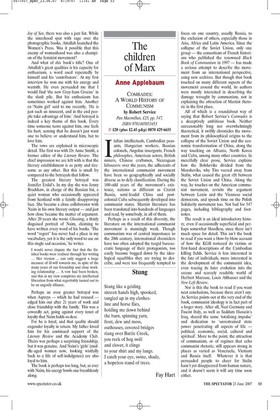The children of Marx
Anne Applebaum COMRADES: A WORLD HISTORY OF COMMUNISM by Robert Service Pan Macmillan, £25, pp. 547, ISBN 9781405053453 © £20 (plus £2.45 p&p) 0870 429 6655 1 talian intellectuals, Cambodian peasants, Hungarian workers, Russian colonels, Angolan insurgents, French philosophes, American actors, British miners, Chinese craftsmen, Nicaraguan labourers: over the years, the adherents of the international communist movement have been so geographically and socially diverse as to defy classification. During the 100-odd years of the movement's existence, nations as different as Czarist Russia, semi-feudal China and postcolonial Cuba subsequently developed into communist states. Marxist literature has been translated into hundreds of languages and read, by somebody, in all of them.
Perhaps as a result of this diversity, the literature on the international communist movement is stunningly weak. Though communism was of central importance to the 20th century, international chroniclers have too often adopted the turgid bureaucratic language of their protagonists, too easily become bogged down by the ideological squabbles they are trying to describe, and were too frequently tempted to focus on one country, usually Russia, to the exclusion of others, especially those in Asia, Africa and Latin America. Since the collapse of the Soviet Union, only one group — the consortium of French historians who published the renowned Black Book of Communism in 1997 — has made a serious attempt to describe the movement from an international perspective, using new archives. But though that book touched on many different aspects of the movement around the world, its authors were mostly interested in describing the damage wrought by communism, not in explaining the attraction of Marxist rhetoric in the first place.
All of which is a roundabout way of saying that Robert Service's Comrades is a deceptively ambitious book. Neither unreasonably long nor overwhelmingly theoretical, it swiftly chronicles the movement from its philosophical origins to the collapse of the Soviet Union and the economic transformation of China, along the way touching on Albania, North Korea and Cuba, among many other countries. In mercifully clear prose, Service explains how the Bolsheviks divided from the Mensheviks, why Tito veered away from Stalin, what caused the great rift between the Soviet Union and China. Along the way, he touches on the American communist movement, revisits the argument between Lenin and the Viennese social democrats, and spends time on the Polish Solidarity movement too. Not bad for 547 pages, including bibliography and footnotes.
The result is an ideal introductory history, even if occasionally superficial and perhaps somewhat bloodless, since there isn't much space for detail. This isn't the book to read if you want a blow-by-blow account of how the KGB tortured its victims or first-hand descriptions of the Cambodian killing fields. Service is less interested in the fate of individuals, more interested in the development of the communist idea, even tracing its later evolution into the arcane and scarcely readable world of Herbert Marcuse, Louis Althusser and the New Left Review.
Nor is this the book to read if you want neat conclusions, because there aren't any. As Service points out at the very end of the book, communist ideology is in fact part of a larger story. After all, Nazi Germany and Fascist Italy, as well as Saddam Hussein's Iraq, shared the same `totalising impulse' and dedication to 'unrestrained state power penetrating all aspects of life — political, economic, social, cultural and spiritual'. More to the point, the attraction of communism, or of regimes that echo communist rhetoric, still appears strong in places as varied as Venezuela, Vietnam and Russia itself. Whatever it is that persuaded people to cheer for Stalin hasn't yet disappeared from human nature, and it doesn't seem it will any time soon either.





























































 Previous page
Previous page